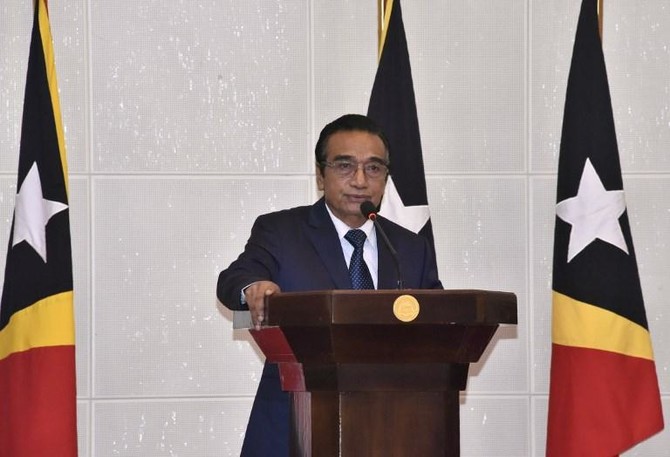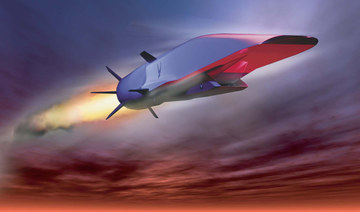JAKARTA: Voters in East Timor will go to the polls on Saturday after President Francisco Guterres dissolved Parliament in January because the minority government led by Prime Minister Mari Alkatiri failed to secure approval for his government’s budget and program.
The elections will be the second in less than a year and are expected to produce a clear winner to end a political gridlock that hampers development for a population of 1.2 million.
It was the first time in East Timor’s 15 years of independence that the Parliament was dissolved, Arif Abdullah Sagran, a former member of East Timor’s election commission, told Arab News in an interview during a recent visit in Jakarta.
The two political blocks are competing to secure at least 35 seats in the 65-member Parliament to form a majority government.
“This will be a hotly-contested election. We will not have political stablity if none of them is able to win at least 35 seats,” Julio Tomas Pinto, a political science professor at the National University of East Timor, told Arab News.
Alkatiri’s Fretilin party narrowly won the July 2017 elections with 23 seats, followed by the National Congress for Timorese Reconstruction (CNRT), the party led by first president and independence hero Xanana Gusmao, which won 22 seats.
But the two political giants were on opposing sides and the Fretilin formed a minority government with the Democrats, which had seven seats, while Gusmao’s CNRT went into coalition with the People’s Liberation Party (PLP), which had eight seats, and the Khunto party, which had five seats, forming a majority in the Parliament.
Pinto said that the CNRT, PLP and Khunto have been campaigning under a new banner, the Alianca Mudanca ba Progresso, or Alliance for Change and Progress (AMP), and the alliance could win the election if the three parties can maintain the same results as last year’s elections.
He added that public perception seemed to favor Xanana’s CNRT as the winner, while Sagran said support from the grassroots for the Fretilin looked strong.
“But there is no guarantee, we have too much floating mass,” said Pinto, who served as secretary of state for defense from 2007 to 2015.
According to data from the International Foundation for Electoral Systems (IFES), there are 784,286 voters and 48 percent of them are women.
The number of eligible voters are roughly the same as last year’s amount, which saw voters not showing up at voting booths.
“We hope voters turnout will be higher this time,” Pinto said, adding that democracy in one of the world’s youngest nation was being tested with the upcoming elections, which he said would set an example for the younger generation.
Gusmao and Alkatiri are two of the most prominent figures in East Timor, which gained its independence in 2002 after it voted to end Indonesia’s 24-year occupation in a referendum in 1999.
The two political lions have dominated East Timor’s politics and both served as the country’s president and prime minister. Caretaker Prime Minister Alkatiri, a Muslim leader of Yemeni descent in a Catholic-majority country, served as the country’s first prime minister in 2002-2006, alongside Gusmao who served as the country’s first president in 2002-2007. The latter also served as prime minister in 2007-2015.
Pinto said members of CNRT and its coalition were mainly former resistance guerillas who fought during Indonesia’s occupation while Fretilin members were mostly diplomats who had been abroad advocating for East Timor’s independence.
“However, we don’t want to contradict the two of them because both forces are assets for East Timor. This election will be a test case of our elite’s political maturity,” Pinto said.
“The people are fed up with the elite’s arrogance. When (the opposition) directly rejected the government’s budget without even deliberating, it was clearly harsh politics and I think the people were quite disappointed with that,” said Sagran, who is president of the Center of East Timor Islamic Community, and like Alkatiri is one of the few Muslim figures who have held positions as government officials in East Timor.
Xanana is enjoying a boost in his popularity after he served as chief negotiator during negotiations with neighboring Australia that resulted in the signing of a treaty on maritime borders between the two countries in March. The treaty promises major revenue sharing with Australia from exploitation of rich oil and gas reserves in the Timor Sea.
According to East Timor’s Maritime Boundary Office, the permanent maritime boundaries served as “the final step in realizing full sovereign rights” for East Timor as a newly independent state since the seas which surround the island sustain its people and are integral to their culture and livelihoods.
If CNRT wins the elections, Xanana could assume another premiership but Sagran said Xanana could appoint someone else from within the coalition ranks as prime minister.
Pinto said that the elections could also be a test of the country’s constitution, which he said was adapted from its former colonizer Portugal.
He said there were articles in the constitution that did not have detailed explanation, such as the deadline to propose the second budget to the Parliament if the first one was rejected. This means each party could interpret them in accordance with their own interests.
“We will see if our constitution will really fit with our people or just be a copy from the Portuguese, which is not entirely implementable here,” Pinto said.



























